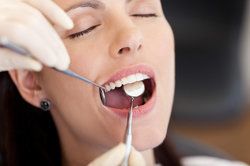The Importance of Oral Cancer Screenings
 Just like other cancer-related checkups, an oral cancer screening is simply a periodic health exam that can detect early signs of cancer. If your dentist recommends this screening test, it doesn't necessarily mean they think you have cancer. It more likely means they care about protecting your overall health - a sign that you have a compassionate, well-trained dentist!
Just like other cancer-related checkups, an oral cancer screening is simply a periodic health exam that can detect early signs of cancer. If your dentist recommends this screening test, it doesn't necessarily mean they think you have cancer. It more likely means they care about protecting your overall health - a sign that you have a compassionate, well-trained dentist!
Cosmetic dentist Bruce Wilderman in Philadelphia definitely believes oral cancer screenings are an important part of routine checkups. He offers the following information and recommendations to help keep his patients healthy and smiling.
Do You Need an Oral Cancer Screening?
Because a complete oral exam helps detect cancer, it is recommended every three years for all patients over 20 years of age and annually for those over 40. Men face twice the risk of developing oral cancer as women, and men who are over 50 face the greatest risk.
Some people are at increased risk of oral cancer and should be more diligent in having these exams regularly. If you use any tobacco products, drink alcohol, have a personal or family history of cancer, or have had excessive sun exposure (especially at a young age), be sure to talk with your dentist about your risk and the need for oral screenings.
What Is Involved in an Oral Cancer Screening?
Most patients tolerate the screening test very well. While you are comfortably seated in the dentist's chair, we will carefully examine your mouth, throat, and neck. We will look for any red or white patches in your skin; open sores on your gums, lips, inner cheeks, throat, and tongue; and any lumps around your mouth, face, or neck.
Many patients frequently have open sores, sometimes caused by bridges or dentures, and the majority of these are non-cancerous. But your dentist should examine all sores very closely and may perform an oral brush biopsy on any areas in your mouth that look suspicious. This type of biopsy is painless and involves using a small brush to take a tissue sample for further testing. In some cases, you may be referred to a specialist for a more extensive biopsy.
During the exam, you might also be asked if you have noticed anything unusual that is not noticeable that day, such as:
- Previous bleeding in the mouth
- Numbness, pain, or tenderness in any area of the face, neck, or mouth
- Old sores on the face, neck, or mouth that take more than two weeks to heal
- Difficulty eating or speaking
- Hoarseness, chronic sore throat, change in voice
- A feeling that something is caught in the back of your throat
- Ear pain
- Dramatic weight loss
If you have noticed any of these signs or symptoms, you should schedule an appointment with your dentist as soon as possible. Remember, screening tests are necessary to detect oral cancer early, before it has a chance to spread.
What Are the Benefits of Oral Cancer Screenings?
Like all cancer screenings, regular testing gives you the best chance for early detection and successful treatment. Routine general dentistry exams that include oral cancer screenings can help maintain your overall health and increase your chances of a long, healthy life.
In addition to regular checkups at your dentist's office, you should conduct an oral self-exam at least once a month. You know your mouth better than anyone, and any changes that you notice will be very important in the detection and diagnosis process.
Learn More about Oral Cancer Screenings
For more information about oral cancer screenings or other aspects of your dental care, we invite you to contact our dental care center today. Our entire team looks forward to learning about your dental needs and concerns and helping you achieve overall oral health and wellness.


